October is in full swing, and so is Synetic’s production of The Tell-Tale Heart. As a part of our behind the scenes series, Managing Director Ben Cunis sat down Alex Mills, who plays Edgar in the show, to discuss the process.
Why don’t you actually tell me the story about when Paata called you about this show. When did that happen? And what made you say yes?
Paata first talked to me about it during the pandemic. He brought up The Tell-Tale Heart, and at the time I did not know the story. And I wondered what he had in mind. And that kind of went into the void. Flash forward and the accident happened…that was a dark time. War of the Worlds got postponed. I got in touch with Paata, first of all, establishing the fact that, okay, yes, he’s alive, he’s going to get better. Then he reached out again. And that had to be probably early in the winter – he was still in the hospital. And I was so surprised that he was talking professionally already. And he said The Tell-Tale Heart is going to happen. And I was like, Paata, absolutely. I’m on board. I get a little choked up actually thinking about it because I was so like, in a place of, like, “are you just okay?” And he was already thinking, thinking forward about future shows.
Those moments are powerful — I remember when Russia invaded Georgia in 2008, I was supposed to be taking a break, and immediately, I remember calling Paata saying, all right, whatever you want, I’ll do it. It didn’t matter to me what the role was. If he had me stand backstage and hand out props I would have said yes. And we did Host and Guest which ended up being an incredibly meaningful experience for all of us.
Yeah, Tell-Tale was like that. And there was a level of responsibility: I knew it was something that he was coming at with a passion and something that he and Ira valued – and that he valued my artistry and my contribution. I don’t think the concept was necessarily fully realized yet, but we knew that if I was on board and was going to really invest myself…we could make magic.
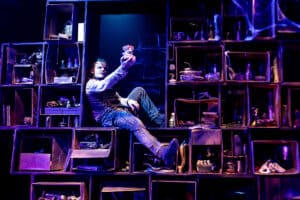
You’ve said yes to the role. You read the story again for the first time. What are you responding to?
Reading it, I was like…I didn’t necessarily connect at the jump. So I didn’t necessarily know where it was going, but I definitely trusted that Paata had a vision. He did mention the dementia aspect, I started to resonate with the mental illness side of it. But I was more anticipating his interpretation of what the story meant rather than just reading it off the page.
Is that normal for Synetic shows for you to initially encounter the story and say, well, there’s something interesting here, but I’m waiting to see what we make out of it?
Oh, yeah. You cannot anticipate what the story really is going to be or not. I mean, we all know the story, but the twist that Paata usually takes is really specifically his take. You cannot just read a story and say, oh yeah, that’s going to be verbatim what’s on the stage.
I remember you saying something in one of our conversations as this show was progressing “Ira is doing something different.” What did you mean by that?
She was starting to look at her own work and be like, okay, why is that the same? And how can I mix it up? It became more emotional to me, like she was starting to think about how could this piece change coming from the perspective of this one specific experience?
She has a direct channel in terms of how to take something that is incredibly emotional and just put it in the body in a way that’s visible. And she knows it when she sees it…and when it’s not there yet.
You know, the night scene between me and Iko (Irakli Kavsadze, who plays The Old Man), we did initially stage it in a very kind of general way coming from a general narrative. But she took it personally. Ira stepped in and she’s like, let’s just cut the concept and let’s do this scene kind of realistically, do it as if you’ve been awake all night. And he wakes you up again, and she built in a rhythm for it. And we improvised through and I remember vividly, Ira was like in tears and I was like, did that work? And she was like, Oh, it absolutely worked.
That was a turning point. That was the first time that me and Iko’s relationship made sense in the rehearsal room. I was like, okay, here we go. There it is.
That scene killed me, by the way. Now about working with Iko. How did you feel about taking on such a big, well…two hander?
So first of all, he’s so thoughtful, like he loves to talk about the behind the scenes stuff, like, okay, so why, why is he thinking this way? Even before we started rehearsing, you know, we’d be sitting outside and he just talked about his own experience with someone with dementia. I brought up my own experience, and that was before we even did any scene work. He’s so improvisational…a lot of the times during rehearsal I was like, how do I keep up? And then slowly, honestly, when we started to get each other more – he slowed down and I sped up. It’s different approaches to the work, you know. We work amazingly well together now.
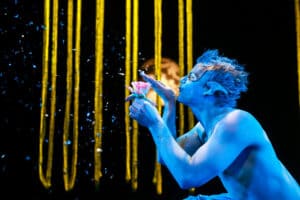
Now that you’re in performance together how do you find this show developing and growing? Because it’s never the same as opening night.
We both bring such immense amounts of energy to what we want the show to be. Every scene, every day is different. There’s stuff that I’ll do that is totally new and he’ll go with it, you know what I’m saying? Like the whole bunny rabbit situation, it became something we could use for dialogue, but I kind of forgot about that. But then he’ll, he’ll do something where he’s like, really sad and I’ll bring the bunny out and then the next day I’ll forget that moment happened and then he’ll just extend his hands. And I’m like, Oh yeah, the bunny.
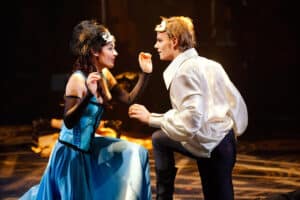
The show really blows up once these amazing vultures show up. You’ve got some big scenes with them. What was very intimate suddenly turns into this surreal kaleidoscope. How do you make the leap between the two?
It’s my gut, to be honest. I don’t know if I have the answer. I guess it has to go to what the vultures mean in the show. What are the vultures? The vultures are a manifestation of my own mental problems. Yeah. So to make that jump is almost like making a jump with anyone who suffers from that.
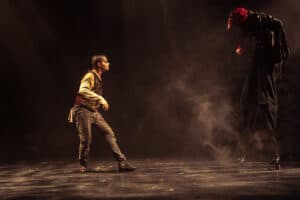
You’re working with some new people in the cast or people who are new to the main stage of Synetic at least. And when you see them coming in and doing some of this really intense ensemble work and participating in this kind of wild process You remember 15 years ago you came in at that point…do you see it being different now for them or are they starting on the same wild ride?
It’s always a wild ride. I think this show specifically is very classic Synetic. It’s all technique based. So I do sense that there’s it’s a, it’s a really good entry point. If I came into this show, I’d be like, Oh my God, this is what it’s all about.
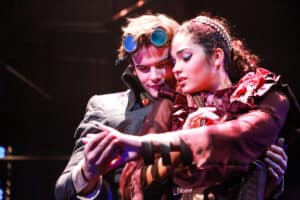
I think the coolest thing about that is how you just said that it’s very classic Synetic, using a lot of the very familiar and difficult and well-honed techniques. And yet we have a show that in some ways feels really fresh at the same time.
Did you think it was fresh?
To be honest, yeah. I mean, I’m the Managing Director at this company, so you would think that I’m kind of obligated to be like, oh, it’s great. But I genuinely did see something different in this. And familiar, in the best way.
Ira pared herself down in some ways. She cut an entire vulture sequence because she was like, It’s too much. She was like, the vultures are taking over and like, it’s not about vultures, you know? It’s about what the vultures are about.
That’s what I remember from working on Synetic shows – you have to redo things a lot to get to the right thing. And it doesn’t denigrate the work that came before it. How you got to the thing that works is the thing that you cut. What matters is working together, honoring each others’ work.
We were doing a Q&A for students last week, and one of the kids asked Iko something like, what was the best part of doing the show? And he brought up working with me in that scene and like Ben, it still makes me want to cry because it is quite fresh. I know that he respects me and I respect him. We’re not like, you know, we don’t ever say it. But the fact is…that meant a lot to me.